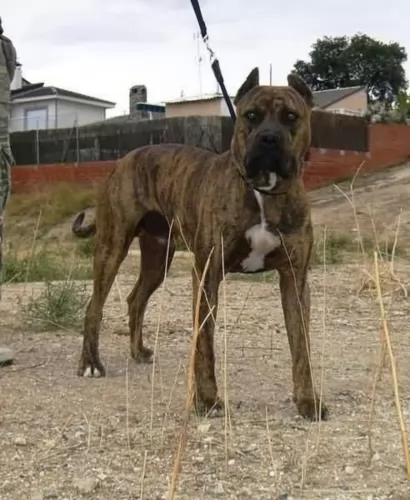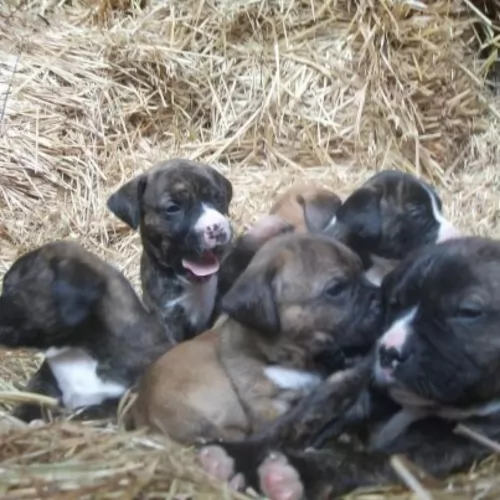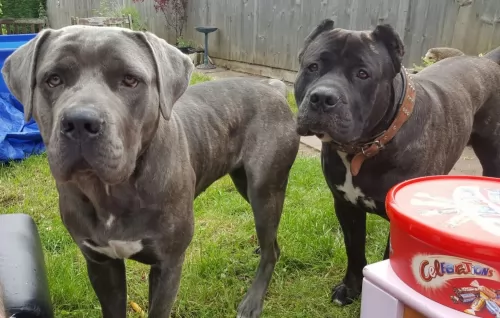 Petzlover
Petzlover Perro de Toro is originated from Spain but Wheaten Terrier is originated from Ireland. Perro de Toro may grow 14 cm / 6 inches higher than Wheaten Terrier. Perro de Toro may weigh 20 kg / 45 pounds more than Wheaten Terrier. Both Perro de Toro and Wheaten Terrier has almost same life span. Both Perro de Toro and Wheaten Terrier has same litter size. Perro de Toro requires Low Maintenance. But Wheaten Terrier requires Moderate Maintenance
Perro de Toro is originated from Spain but Wheaten Terrier is originated from Ireland. Perro de Toro may grow 14 cm / 6 inches higher than Wheaten Terrier. Perro de Toro may weigh 20 kg / 45 pounds more than Wheaten Terrier. Both Perro de Toro and Wheaten Terrier has almost same life span. Both Perro de Toro and Wheaten Terrier has same litter size. Perro de Toro requires Low Maintenance. But Wheaten Terrier requires Moderate Maintenance
 The rare Spanish Perro de Toro seems to have unclear origins, with some saying the dog is a direct descendant of the Toulouse Mastiff, while others say that the dog was developed by crossing the Alano with the Dogue de Bordeaux.
The rare Spanish Perro de Toro seems to have unclear origins, with some saying the dog is a direct descendant of the Toulouse Mastiff, while others say that the dog was developed by crossing the Alano with the Dogue de Bordeaux.
The dog hails from Spain and was once used as a fighting kind of dog but today it is essentially a family pet. The dog is an ancient breed, an ancestor of many of the molosser breeds that are around today.
 The dog was bred to be a useful dog to have around the farm. He was needed to help with the guarding and herding of livestock and to keep the rat population down.
The dog was bred to be a useful dog to have around the farm. He was needed to help with the guarding and herding of livestock and to keep the rat population down.
This little dog has a long history, but in spite of this, he wasn’t recognized as a breed in his home country by the Irish Kennel Club until 1937.
It was in 1943 that the Wheaten was recognized by the British Kennel Club. They were exported to the United States in the 1940s and recognized by the American Kennel Club in 1973.
 This is a strong, powerful, large breed of dog, making a good watchdog and guardian. He can be anything from 56 to 64cm in height and weigh between 34 and 40kg.
This is a strong, powerful, large breed of dog, making a good watchdog and guardian. He can be anything from 56 to 64cm in height and weigh between 34 and 40kg.
The nose of the dog is broad and black, the ears are set high and droop over slightly,making them floppy ears, but they have always been cropped to stand up erect.
He's a sturdy dog and the tail is fairly thick at the base, tapering to a point. These days it tends to be undocked and left long. The neck is strong and powerful too and the head brachycephalic. The short coat includes colors such as yellow, grey, fawn and red with the black mask.
The Spanish Bulldog looks fairly intimidating and he will certainly need training and socialization if he is to be obedient and well behaved.
He isn’t aggressive but is confident, dominant, fearless, loyal and also loving towards his owner. He is devoted towards his human family and is good with children. Like any mastiff type breed, he will need a firm, kind, consistent, patient owner. This is the kind of owner who will understand this breed type and take time out with him to exercise him and provide him with mental and physical stimulation so as to prevent boredom.
 The Wheaten Terrier is a robustly built, medium-sized dog with males and females standing at between 43 to 50cm in height and weighing between 13 to 20kg.
The Wheaten Terrier is a robustly built, medium-sized dog with males and females standing at between 43 to 50cm in height and weighing between 13 to 20kg.
The soft, single coat is a silky texture and a wheaten, gingery color. A bonus is that the coat doesn’t shed much. Puppies are born with darkish coats of a reddish-brown color but the coat lightens significantly as the puppy grows older.
Most Wheaten Terrier owners opt to have the dog professionally groomed. Their tails have always been docked.
Your Wheaten Terrier is a smart dog, albeit headstrong and stubborn. His intelligence makes it easy to have him trained.
They love their human family and aren’t known for any aggression issues. They’re energetic, playful dogs and are sometimes even looked upon as being hyperactive. They’re able to get along well with other dogs and cats in the house. They generally make great family pets.
These dogs are well suited to life in the city as well as the countryside just so long as he gets his daily walks and other forms of exercise.
 Contrary to what many people think, the temperament of the Perro de Toro is calm and well balanced. This is a reliable, loving, loyal dog who wants to protect his human family.
Contrary to what many people think, the temperament of the Perro de Toro is calm and well balanced. This is a reliable, loving, loyal dog who wants to protect his human family.
He gets on well with children and with pets in the home and when trained and socialized, this intelligent dog is well mannered, obedient and sometimes even submissive.
True, the Perro de Toro has a history of being involved in all kinds of things, from hunting to fighting and also being a working dog, but he is now waiting to show you what a splendid pet he can be if he is raised by the right kind of people.
 The Wheaten Terrier is such a bouncy, lively little dog that he brings joy into any home.
The Wheaten Terrier is such a bouncy, lively little dog that he brings joy into any home.
He is energetic, playful and full of the joys of living but you don’t want to take advantage of his good nature.
Don’t leave him stuck in your back yard but include him in all your family activities. He’s your best friend, providing you with unconditional love that few humans can equal.
 This is a dog breed that is fit and healthy, but to keep him that way you want to make sure he has enough exercise, love and nutritious food.
This is a dog breed that is fit and healthy, but to keep him that way you want to make sure he has enough exercise, love and nutritious food.
He is not known to suffer from any particular disease, but even so, it is wise to be aware of some of the common dog illnesses that your dog could pick up so you can get veterinary help for him just as soon as possible.
With cancer, cells grow rapidly and invade tissue. Dogs can get any of the many cancers there are. Both hereditary and environmental factors can contribute to the development of cancer in canines. Cancer can show up as lumps, swelling, sores that won’t heal, weight loss and difficulty with breathing.
Heartworms are transmitted from one animal to the next by mosquitoes. These worms live in the heart and pulmonary arteries of an infected animal, travelling through the bloodstream and causing havoc. Heartworm is dangerous and can actually be life threatening. Symptoms include coughing, vomiting, battling to breathe and weight loss.
This is a viral disease that can strike terror in anybody who has seen an animal with rabies. It affects the brain and spinal cord of your dog. It is preventable through means of a vaccine. Once symptoms appear, it is a disease which is nearly always fatal.
 Your Wheaten Terrier is a dog breed that can live healthily with you for a good number of years.
Your Wheaten Terrier is a dog breed that can live healthily with you for a good number of years.
Just like most other dogs, they are prone to some heritable diseases. Perhaps a condition to look out for with this particular dog is protein wasting conditions - protein-losing nephropathy (PLN) and protein-losing enteropathy (PLE).
Both of these diseases are actually fatal but if caught early enough, they can be managed with dietary changes and medication.
Your dog produces proteins known as enzymes, one group being digestive enzymes that help with the breakdown and digestion of food. When your pet battles with malabsorption, digestive enzymes don’t absorb protein and it passes through the large intestine into the faeces. Your dog will have inflammatory bowel disease.
 If they are not being used as working dogs, they are family pets, and you need to give them a lot of daily exercise. You will need to give him some walks or hikes and allow him a good run in the country.
If they are not being used as working dogs, they are family pets, and you need to give them a lot of daily exercise. You will need to give him some walks or hikes and allow him a good run in the country.
The Perro de Toro is a short haired dog, and as a moderate shedder, he isn’t going to require too much grooming. A brushing twice a week will help get rid of his hair.
When brushing him, turn it into a bit of a grooming session and check inside his ears, look at his eyes and try to look inside his mouth. He can’t tell you if he has terrible toothache from a rotting tooth and he will rely on you to check his teeth.
Mastiff type dogs need a wholesome diet to remain strong and active. If you are going to feed your pet one of the commercially manufactured dog foods, make sure it is one of the top quality ones.
Avoid the ones that use lots of colorants, preservatives and unhealthy fillers as these can make your dog sick. Try and give him some home-made food which can be added into his dry kibble occasionally.
Boiled chicken, brown rice or pasta and some vegetables such as carrots, sweet potato and spinach chopped up will be excellent for him and will ensure he doesn’t battle with digestive upsets. If you can, every now and then try to include some raw meat for the benefit and health of your pet. Never leave him without a bowl of fresh, cool water.
 Brush your pet’s coat twice a week to keep it healthy and have him professionally trimmed to keep him looking nice and groomed.
Brush your pet’s coat twice a week to keep it healthy and have him professionally trimmed to keep him looking nice and groomed.
Dental disease is a common problem with dogs, and more specifically small dogs. Dental problems start with tartar build-up on the teeth and then infection of the gums and roots can set in too. The teeth have to be kept in good condition as rotten teeth can have a negative impact on other important body parts like the heart and kidneys.
Have your pet vaccinated against bacterial and viral infections such as rabies and parvo.
Speak to your vet about the many worms and other parasites that can invade your pet’s body.
Provide your Wheaten with the best food there is to encourage good health and longevity. Keep his meals simple and consistent and always go for high-quality foods that are in keeping with your dog’s age, Kibble as well as home-made food are good choices. Never leave your pet without a constant source of fresh, cool water.
Provide your Wheaten Terrier with good exercise. Remember though that these dogs are sensitive to warm temperatures, and you don’t want to have him exercising in hot weather because of the fear of heat stress.